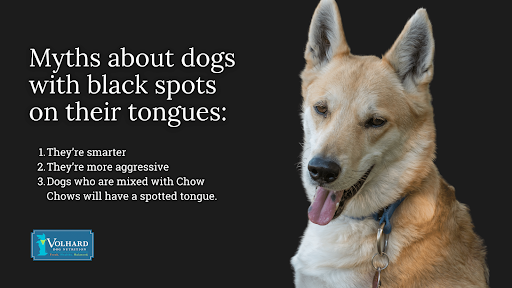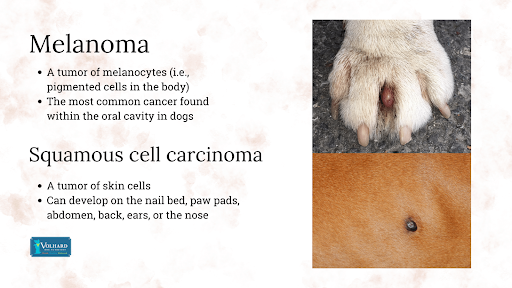Why are There Black Spots on My Dog's Tongue?
Posted by Volhard Dog Nutrition on Apr 28th 2023
While checking her dog's mouth, Melinda noticed some pigmented spots on their tongue. Right away, scary thoughts of serious medical issues popped into her head. But is Melinda's anxiety warranted?
On the contrary, this is a cause for joy for multiple reasons! First, because she's being observant of the changes occurring in her dog's oral cavity (which often go unnoticed). And second, the dark spots on a dog's tongue are just markings that develop when more pigment is deposited in one area of the tongue. These dark pigmentation spots can appear not only on the tongue but on other body parts as well, such as the eye rims, lips, nose, paw pads, and toenails. They're just as harmless as they are unique!
The second you research these black spots online, you'll come across a lot of chatter surrounding spotted tongues, some of which have turned into outright myths (e.g., that a black-spotted tongue translates into a smarter or a more aggressive dog). We're here to dispel such baseless beliefs and help parents see these black spots for what they are: marks of their dogs' uniqueness. Think of them as the beauty marks of the canine world!
What Do These Black Spots on My Dog's Tongue Look Like?
Your dog's tongue spots can come in a range of shapes and sizes. They are most often dark in color (i.e., either dark blue or black).
One thing to pay attention to is the texture of these dark spots. They should always be flat and present the same texture as the surrounding tissue. As long as the elevation and texture correspond with the rest of the tongue, there's nothing to worry about.

What Do Black Spots on a Dog's Tongue Mean?
The origin of these dark pigmentation spots still puzzles the scientific community. Although most scientists and veterinarians don't really understand what causes them, what we do know is that black spots are a hereditary trait. But there's no deeper meaning to this hyperpigmentation, since it doesn't affect your dog's taste buds.
When Do the Spots on Your Dog's Tongue Appear?
The tongue spots can appear at any point in a dog's life. Some puppies are born with them, whereas others develop these markings later in life — it's all perfectly normal!
What Dog Breeds Have Black Spots on Their Tongues?
Many dog owners are curious whether spotted tongues are the breed standard for some dogs. Indeed, that is the case for two breeds: purebred Chow Chows (with their dark tongues) and Chinese Shar-Peis (with a blue-black tongue). But there's no way to predict tongue spots in other breeds, although they're often seen in other purebred dogs such as:
- Australian Cattle Dogs
- Australian Shepherds
- Border Collies
- Cocker Spaniels
- Dalmatians
- Doberman Pinschers
- English Setters
- Flat-coated Retrievers
- German Shepherds
- Golden Retrievers
- Gordon Setters
- Great Pyrenees
- Irish Setters
- Keeshonds
- Labrador Mastiffs
- Mountain Curs
- Siberian Huskies

When Do Black Tongue Spots Become a Concern for Your Dog's Health?
Dark tongue spots might be regular occurrences, but it's best to constantly keep an eye on them. So inspect your dog's tongue whenever brushing their teeth to ensure that the black spots haven't changed in texture or elevation. In addition, it never hurts to have any new spots inspected during routine vet visits.
Any raised and hardened spots on a dog's tongue do become a matter of concern, as they're signs of melanomas and squamous cell carcinomas — two of the most common oral cancers in dogs. The tumors from both cancers appear as dark masses on the dog's tongue or along the mucous membranes, so you will immediately tell the difference between these tumors and pigmented spots.
Other signs of tumors in your dog's mouth include:
- Difficulty eating
- Excessive drooling
- Foul-smelling breath
- Weight loss
Celebrate Your Dog's Tongue Spots As Beauty Marks!
The black spots on your dog's tongue are nothing but hyperpigmentation — without an apparent reason, meaning, or functionality. So you can appreciate them as a unique trait of your furry friend! However, be sure to keep a constant eye on them and contact your vet when noticing any changes in texture and elevation. For more advice on dog nutrition, health, and training, make sure that you contact us and check out our blog!
Volhard Dog Nutrition and its expert nutritionists are now offering online consultations to help more dog parents discover why, what, and how to feed their dogs the healthiest of foods! Speaking to a Volhard nutritionist will help you understand the inseparable relationship between healthy food, a healthy body, and a healthy mind. If you're interested in contacting one of our Volhard nutritionists, don't hesitate to access our
consultation page!

